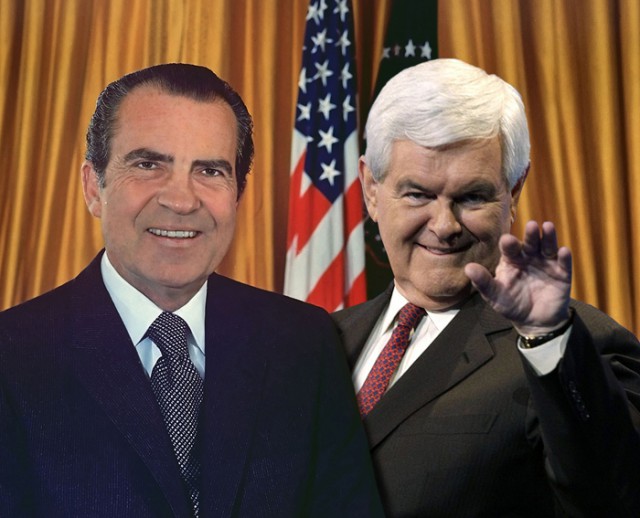
Harvey and I were just tucking into a new batch of Alice B. Toklas fudge when there was a knock on the door.
It was Richard Nixon. “Come in and grab some fudge and an eggnog,” I said.
“Well, this is a pleasant surprise,” I added, as he sank heavily into a bean bag chair. “I thought you would be spending the holidays in Purgatory again, and I don’t mean the ski area.”
“The Republican race in Iowa got so hot that they ran out of volunteers,” he said. “So I got a work-release gig canvassing precincts in Keokuk.”
“Who are you canvassing for?” I asked.
“I got assigned to the Huntsman campaign,” he said.
“Wow, that’s harsh,” I said. “Canvassing for Huntsman beats talking to yourself,” he shot back, “even though it involves less human contact.”
I didn’t say anything. “Anyway, I wanted to drop by and congratulate you for becoming a Republican,” he said. “But I’m curious. What prompted a life-long Democrat like you to change your registration?” “You may recall I left the Democratic Party in 2008, when I decided to support John McCain in the general election,” I said. “I changed my registration to independent back then. This year, I wanted to support Gingrich, so I changed my registration to ‘R’ so that I could caucus with the Republicans.”
“I figured you would be a Gingrich supporter,” he said. “It was obvious.”
“How so?” I asked. “Well for openers, a hopeless political romantic like you would be instantly seduced by Newt’s history thing,” he said.
“Busted,” I thought. “Well, I think it’s a big plus to have a president who has studied American his tory and draws sustenance and guidance from it,” I said. “The present incumbent doesn’t seem to have much interest in history, and it shows.”
He nodded in agreement. “More important, you’re attracted to Gingrich because he’s running for office essentially the same way you used to do it,” he said. “Before you ever announced you were running you used to get a yellow pad and draw a vertical line down the middle of it. On the left hand side you would make a list of the major issues in the campaign. On the right you would make a parallel list of what you would do about each of them. Then you would tear the sheet in half along the line and toss the list on the left. The list on the right, the solutions, became your platform.”
“That’s the way I used to do it,” I agreed.
“And that’s basically the way Gingrich is doing it,” he went on. “He’s spent years defining problems and crafting proposals to solve them.” “It’s a powerful way to campaign,” he said. “You define yourself in terms of your solutions. That makes it much harder for your opponents to define you.
And if you have a list of plausible solutions and your opponent doesn’t, there’s a good chance your list will define the terms of the debate in your race, which gives you a huge leg up.”
“Even if people disagree with some of your solutions, you’ll get some respect and support just for telling people where you stand,” he said. “Some of them will vote for you even though they disagree with you on a lot of stuff.”
“You’re right,” I said. “I used to hear that a lot.”
“Of course, running on solutions can be a two-edged sword — and a serrated one at that — especially if you have to run in a primary,” he continued. “Original and creative solutions can get you noticed and attract passionate supporters, but they can also give you a reputation as a maverick, or worse as a heretic, in the eyes of your party’s more ideologically orthodox members. It allows your opponent to attack you for being erratic or inconsistent or a hypocrite or zany — which is what’s happening to Gingrich in Iowa.” “Tell me about it,” I said. “Newt’s getting hit with a $10 million shit storm of negative ads in Iowa. If last week’s polls are accurate, he’s lost between a third and half of his support in less than a month. Can he come back?” “Sure, he can, especially this year,” Nixon said. “But he can’t if he doesn’t counter-attack hard, which he should have done immediately.
“Trust me on this,” he said without a trace of irony. “When it comes to negative campaigning, I’ve had a lot of hands-on experience. The first rule of negative campaigning is this: Unanswered charges stick, no matter how ludicrous they are and no matter how well defined you are. I’m surprised a politician as experienced as Newt has been so derelict in defending himself.”
“So does this mean you think Romney will be the stronger candidate?” I asked.
Nixon nearly choked on his eggnog. “You’ve got to be kidding,” he said.
“Romney inspires minimum passion and instant distrust — especially among conservatives. And conservatives make up 40 percent of the American electorate. Newt could crater spectacularly or, against all odds, he could pull off a transformative victory — like Reagan. He could change the trajectory of an election. I don’t think Romney can do that.”
Just then his pager went off. Nixon glanced at it and reached for his coat.
“That was the National Reconnaissance Office,” he said. “One of its drones just detected an undecided voter in Keokuk. Gotta run.”
Respond: [email protected] This opinion column does not necessarily reflect the views of Boulder Weekly.














